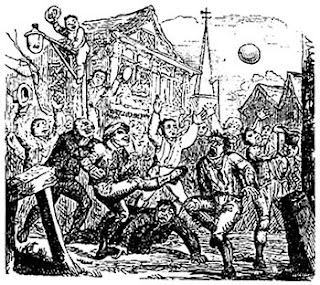"In practice, however, the notion of "absolute" Westminster sovereignty has been on the wane since 1973, when not only did the UK join the European Economic Community (thus ceding sovereignty to a wider union) but also sanctioned a "border poll" in Northern Ireland. In a precursor of next year's independence referendum, the latter invited the people of the six counties to choose their constitutional future (in or out of the UK) via a referendum."
"Thus Westminster conceded that the province was sovereign, as in fact it had been since opting out of the Irish Free State some 50 years before. Similarly, the devolution referendums of 1979 and 1997 acknowledged sovereignty in Scotland and Wales. Indeed, throughout the 20th century Parliamentary sovereignty was ceded repeatedly. The tiny Sultanate of Brunei only became independent from the UK in 1984, while this year David Cameron has emphasised the sovereignty of Crown subjects in the Falklands and Gibraltar."
Certainly, different political claims were advanced and recognised in these
accessions and referendums - but why should we conceptualise all of them
as exercises in recognising sovereignties? Legally, much of this is problematic. But I'm conscious that law need not -
and should not - have the last word on our political thinking. But even
without privileging a legal analysis, I'm not convinced that Torrance's
expansive approach to defining sovereignty is terrifically helpful.
Firstly, it is useful to bear in mind that the concept of
sovereignty
has multiple traditional senses and meanings. We might be talking about
the sovereignty of a state recognised by international law. If you are
not a state, you cannot be sovereign in this sense. Alternatively, we
might want to focus more narrowly on recent British constitutional traditions,
in which
parliament is sovereign. Here, sovereignty relates to the idea
that parliament may make or unmake any law, and its determinations
about what the law ought to be generally cannot be challenged in court,
as the validity of American statutes may be constitutionally challenged before their
Supreme Court.
Here, the sovereignty of parliament primarily regulates
the relationship between parliament and the executive and judiciary, and
between one parliament and its successors. In Torrance's third sense, we have the "Scottish constitutional tradition" of popular sovereignty, echoed by the SNP and others. Despite my Nationalist sympathies, I find much of this is pretty dubious intellectual history, tracing an questionable line from a wilful misunderstanding the oligarchy defended by Declaration of Arbroath, through misconstructions of the poisonous anti-Catholicism of the Claim of Right of centuries later - to the anti-Westminsterism of the Scottish constitutional tradition as promoted in many Nationalist circles today. I'll vigorously defend the political principle of popular sovereignty, but lord deliver us from the ridiculous fantasy of Scotia's medieval democrats.
The 1997 devolution referendums did not recognise any
sovereignty of the Welsh or Scottish people
in any legal sense, nor did joining the EU "cede" - in the sense of giving up, or alienating - parliament's sovereignty either. Powers devolved are powers retained.
De facto it might be politically difficult for Westminster to reverse legislation adopted by Holyrood, or to abolish it outright, but
de jure, the competence exists and the courts would enforce it. The same goes for the law of the European Union, which enjoys
supremacy over domestic law - but for the purposes of a UK constitutional analysis, only because Parliament itself has assented to be bound by it.
In his lectures at the University of Edinburgh in the early 2000s,
Professor Colin Munro gave us the traditional, if rather starchily Victorian view of
Albert Venn Dicey: the Crown in Parliament is sovereign.
End of. In contrast with his monolithic structure, David sees a flourishing
field of different (and competing?) sovereignties. European
institutions take decisions on the scope of our human rights, and shape
our ability to move, trade, work and study freely within its bounds. And David is right. Or at least, half right.
In practice, parliament mostly accepts these decisions and submits to these determinations. Holyrood follows its own path, the people decide on devolution through a legislatively-summoned referendum, and will decide on independence to boot. Who the hell is really sovereign here anyway? As Lord Hope observed in the AXA judgment of the UK Supreme Court, Holyrood is a creature of statute and not a sovereign body. Had the independence referendum preceded without the section 30 order, we might all have had cause to understand the consequences of that fact more clearly. Sovereignty must be about more than having an influence on the political scene, or promulgating laws. The authority to get your way in the last instance matters.
But surely these realities matters more than the nice, pristine constitutional theory-building? I'd sympathise with that, somewhat. The concept of parliamentary sovereignty is a rotten guide to how the British democratic system functions. But that doesn't mean that generalising the concept of sovereignty is the best way to knit together a better understanding.
There is a significant risk of sogginess about Torrance's approach. If we're defining sovereignty as any decision taken by bodies discharging public function which are perceived as legitimate, and are complied with - and at its loosest, David seems to be suggesting something along those lines - where's the limit?
For example, the scale of the UK administrative state has developed significantly since the beginning of the 1900s. Ministers command executive agencies and officers, not entirely freely, but with broad statutory grants of powers by parliament. Theoretically, parliament remains sovereign and the font of all legitimacy - but de facto, the executive has a powerful defining role. If we're being hard-headed realists, we'd note that ministers and their functionaries often get their way, making regulations, establishing the detail of a whole gamut of entitlement schemes. Parliament may be sovereign, but it is largely left to them. Should we see the administrative state as an alternative "sovereignty" too?
The forces of organised capital have
considerable impact on our law-making and policy-setting. Thanks to
privatisation and the outsourcing of delivering public functions, the
distinction between public and private bodies is increasingly
problematic. Should we see boardrooms and businessmen as representing
another alternative "sovereignty"? At its loosest, David seems to be
referring to all sorts of legitimated exercises of power by
"sovereignty". I can't see what is gained - and much is lost - by generalising our conception of sovereignty in the manner he proposes.
I'd imagine David would want to draw a categorical distinction between these examples and the examples he gives. But what's the real difference? Territory? Institutional structures? Ghostly ideas of nationality or ethnicity or somesuch? None of these seem - to me - particularly persuasive bases to make such distinctions, once you've plucked out sovereignty's distinctive characteristics, as traditionally understood. An absolute monarch who takes good advice, and changes her mind, keeps her throne. If she is deceived by influential underlings, she also remains in place. The quality of the advice she receives is important for the courtier or the calculating diplomat, but it does not remove her crown; sovereignty is better conceived as a thing apart from the eddies and tides which govern its exercise.
I'm also a mite perplexed by the implication that the creation-myth of parliamentary sovereignty should be seen as an outmoded and unrealistic abstraction - worthy enough stuff to inflict on undergraduates in an arid constitutional law seminar - but of peripheral interest for the practical man of the political world. If anything, the last three years has seen a remarkable upswing in the rhetoric of the "erosion of parliamentary sovereignty". The notion is consistently invoked to criticise the legitimacy of any and every inconvenient ruling emanating from the European Court of Human Rights. Taking them on their own terms, many of the Tories who've manacled Cameron to an EU referendum would offer similar explanations for their attempt to "repatriate" relinquished powers to Westminster.
Sovereignty's late flourishing is one of the primary reasons for
my skepticism about the possibility of further devolution after a No vote. Britian may not be a unitary state, but the
political imaginations of UK politicians and media are ever-more myopic, uninterested in finding ways to integrate our increasingly
politically disunited kingdom.
Our zombie broadcasters continue to ignore devolution. We hear incessantly about "the NHS", "the" education system. Recognising even this little complexity - seemingly impossible. Whatever the realities of devolution and distributed power, if a sovereign parliament sees itself and is seen by its main commentators as the only legitimate game in town - woe for the federalist, trying to unearth a new constitutional politics for the United Kingdom.
You may well wish things were otherwise, but you might as well plant your seed in the desert.













